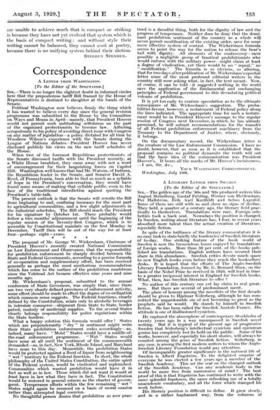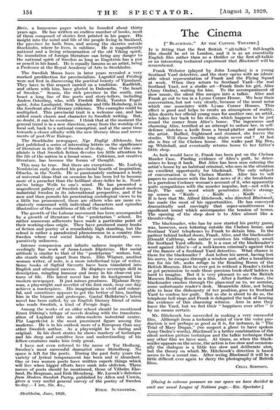A LITERARY LETTER FROM SWEDEN [To the Editor of the
SPECTATOR.] SIR,—The golden age of the '80s and '90s produced writers like August Strmdberg, Gustaf FrOding, Werner von Heidenstam, Per Hallstrom, Erik Axel Karlfeldt and Selma Lageriiif. Some of them are still with us and show no signs of decline. They held, a quarter of a century ago, the literary field prac- tically to themselves. Translations were rare. Foreign cele- brities took a back seat. Nowadays the position is changed. In Sweden, writing about literature has, I fear, in recent years absorbed more talent than the actual creation of literature, especially fiction.
In spite of the brilliance of the literary commentators it is no easy task to state briefly the tendencies of Swedish literature of to-day. One striking feature of the book world of Sweden is now the tremendous boom enjoyed by translations of foreign works. More than 50 per cent. of tha books pub- lished are translations. English authors have secured their share in this abundance. Swedish critics devote much space to new English books even before they reach the booksellers' desks. It is hoped that the efforts of The Anglo-Swedish Literary Foundation, formed by Mr. G. Bernard Shaw, on the basis of the Nobel Prize he received in 1926, will lead in time to a greater reciprocal interest in England for Swedish books. What, then, has Swedish literature to offer ?
No author of this century can yet lay claim to real great- ness. But there are several of predominant merit.
The place of honour among the novelists of the first decade should be given to Hjalmar Soderberg, although he has com- mitted the unpardonable sin of not becoming so great as the prophets said he would. He stands by himself in Swedish fiction. He has been called the Swedish Anatole France. His attitude is one of disillusioned cynicism.
He captured the atmosphere of contemporary Stockholm of twenty years ago in a way unsurpassed in Swedish novel writing. But it is typical of the present age of progressive Sweden that Siiderberg's intellectual cynicism and epicurean genius has completely lost its hold on the public. Some of his works, however, and especially his short stories, will always be counted among the gems of Swedish fiction. Soderberg, in any case, is among the first modern writers to whom the Anglo- Swedish Literary Foundation would pay attention.
Of incomparably greater significance in the national life of Sweden is Albert Engstrom. To the delighted surprise of everyone he was elected a few years ago a member of the Swedish Academy. This set the seal on the changed outlook of the Swedish Academy. Can any academic body in the world be more free from narrowness of mind ? The best proof of this is that Engstrom has continued to write with the same splendid frankness, the same refreshing use of a totally unacademic vocabulary, and all the force which stamped his work before.
His literary position is difficult to define. It grew slowly, and in a rather haphazard way, from the columns of
Strix, a humorous paper which he founded about thirty years ago. He has written an endless number of books, most of them composed of stories first printed in his paper. His insight into the mind and life of the people living m Suittland, the province he hails from, and among the skerries outside Stockholm, where he lives, is sublime. He is magnificently national and a living reincarnation of the old Viking spirit. No inundation of foreign literature can bring any danger to the national spirit of Sweden as long as Engstrom has a pen or pencil in his hand. He is equally famous as an artist, being a Professor at the Royal Academy of Arts in Stockholm.
The Swedish Muses have in later years revealed a very marked predilection for provineirilism. Logerkif and Froding were not first in discovering the poetical beauty of Vilimland. They have in this respect carried on a tradition. Karlfeldt, and others with him, have gloried in Dalecarlia, " the heart of Sweden." Scania, the rich province in the south, can boast a long line of fine poets and story-tellers, including Anders Osterling, who, with Fredrik Book, Torsten Fogel- quist, John Landquist, Sten Selander and 011e Holmberg, is in the forefront also of literary criticism. The examples could be multiplied. This provincial trait is a welcome one, and has added much charm and character to Swedish writing. But, no doubt, it can be overdone. I think that at the moment the general trend is in a new direction, away from the worship of a local soil, back to a national conception, and at the same time towards a closer affinity with the new literary ideas and move- ments of post-War Europe.
The Stockholm newspaper, Nye Dagligt Allehanda, has just published a series of interesting letters on the significance of literature in the life of Sweden of to-day. One of the com- plaints is that Swedish fiction devotes too little attention to the life of the nation in a broad sense. Criticism, not creative literature, has become the forum of thought.
This may be true. But there are exceptions. Mr. Ludvig Nordstrom early deserted his provincial hearth of inspiration, Obacka, in the North. He so passionately embraced a body of universal ideas that on occasion he has been led to become more of a preacher than the brilliant story-teller he is. Nord- striim brings Wells to one's mind. He has presented a magnificent gallery of Swedish types. He has placed modern industrial Sweden in its international perspective, and if he now and then permits his penetrating sociological views to be a little too pronounced, there are others who are more ex- clusively concerned with individual characters and episodes illustrative of the conditions of life of the nation.
The growth of the Labour movement has been accompanied by a growth of literature of the " proletarian " school. Its rather numerous adherents have made a particular point of their working-class origin. They have produced many books of fiction and poetry of a remarkably high standing, but the school is rather a paradoxical phenomenon in a country like Sweden where real social hardship is, fortunately, com- paratively unknown.
Intense compassion and infinite sadness inspire the ex- ceedingly fine work of Anna-Lenah Elgstrom. Her social attitude is similar to that of the "proletarian" writers, but, she stands wholly apart from them. Elias Wagner, another woman writer, of note, is a more intellectual type of writer. Some books of Sigfrid Sievertz have been translated into English and attained success. He displays sovereign skill in description, mingling humour and irony in his clear-cut pic- tures of life. His latest novel has for its background the modern newspaper. It just misses greatness. Hjalmar Berg- man, a playwright and novelist of the first rank, may one day achieve a masterpiece. His imagination is vivid and colour- ful, and sometimes appears to get the better of him, landing
him in the bizarre and grotesque. Gustaf Hellstrom's latest novel has been called, by an English literary friend of mine who reads Swedish, a kind of Forsyte Saga.
Among the works of an older school should be mentioned Ernst Didring's trilogy of novels dealing with the transform- ation of Lapland into an ultra-modern industrial centre.
Ilr Lagerkvist is the most prominent figure among the moderns. He is in his outlook more of a European than any
other Swedish author. As a playwright he is daring and original. In his short stories he shows mastery of technique and his deep and sensitive love and understanding of his fellow-creatures make him truly great.
I have not even referred to the naive of Tor Hedberg, Sweden's most successful dramatist since Strindberg. No space is left for the poets. During the past forty years the
variety of lyrical temperament has been and is abundant. One or two women poets have written superb things which
will live when bigger efforts have sunk into oblivion. Three
names of poets should be mentioned, those of Vilhelm Eke- lund, Bo Bergman, and Erik Blomberg. Mr. Locock's Selection from Modern Swedish Poetry, published by Allen and Unwin, gives a very useful general survey of the poetry of Sweden to-day.—I am, Sir, &c., Stockholm, June, 1929.
ESKIL SUM:OSTROM.



































 Previous page
Previous page